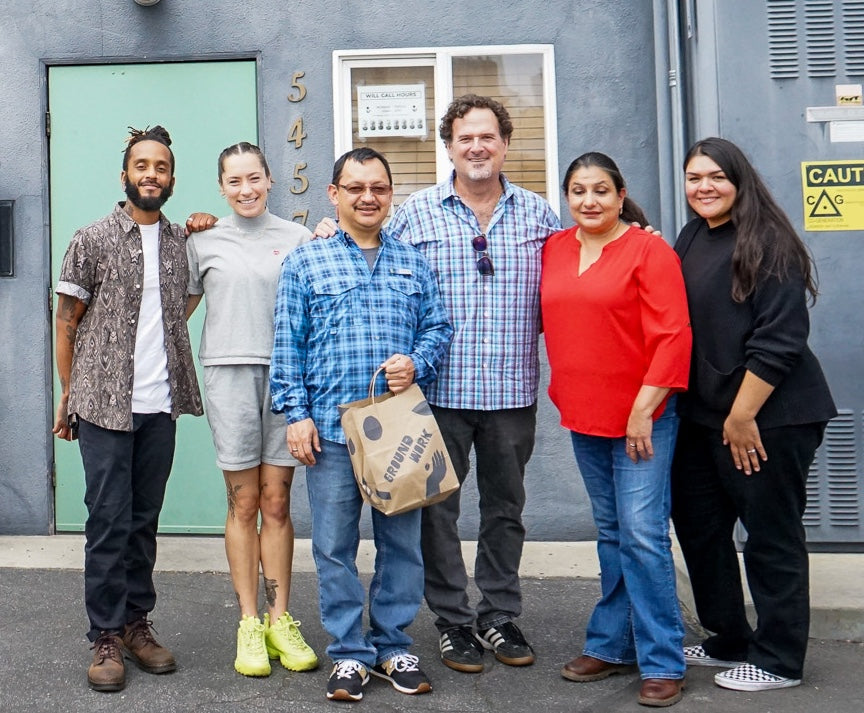What true Relationship Coffee looks like
Francisco’s Groundwork visit
The coffee industry has no formal definition for “direct trade” or “relationship coffee,” but Groundwork interprets these terms to mean that importers, exporters, and roasters work with coffee producers in mutually beneficial partnerships and form genuine human connections.
Chief Coffee Guy Jeff says the producer-buyer relationship should be tight enough that they recognize each other at coffee expositions and call out the other’s name across the crowd just like a friend would.
I witnessed this trade philosophy when Juan Francisco, farmer and general manager of FECCEG (La Federación Comercializadora de Café Especial de Guatemala), stopped by the Groundwork headquarters a few months ago. Juan and his wife, Marta, flew from Quetzaltenango, Guatemala to visit family and friends and they made it a priority to catch up with Jeff over lunch.
La Federación Comercializadora de Café Especial de Guatemala
Jeff and Francisco met in 2015 and their relationship has remained strong ever since. Jeff has been to Juan’s farm and bought coffee from it several times as special reserves. Groundwork also continues to source coffee from FECCEG. As a federation of 15 producer organizations and cooperatives, FECCEG represents nearly 2,000 organic small farmers of specialty coffee, honey, panela, and cacao. Groundwork buys natural coffee from these producers and, given how difficult the natural process is to manage, the level of their coffee’s consistency each year is extremely impressive.
Before lunch, Jeff rounded up some of the Groundwork team – Erica, Su, Darrell, and myself – and led a roastery tour for Juan and Marta. Darrell and Jeff set up a cupping of FECCEG’s honey-processed sample from Joyabaj municipio in Quiché, Guatemala, along with some Ethiopian and Peruvian samples. Our cupping notes for FECCEG’s honey process were a sweet strawberry jam flavor, syrupy mouthfeel, and a full body.
Learning about the universal benefits of natural fermentation
Although honey-processed coffee has nothing to do with honey bees, the process utilizes the natural fermentation of sugars in coffee fruit in the same way that can be done with sugars in bee honey. Juan and Marta taught us how they apply fermented honey water – which is packed with local micro-organisms – to coffee plants in their farms as super-effective protection against pests and fungus. Raw honey has beneficial bacteria that act in the soil and on trees as it does in our stomachs – creating a robust microbiome that protects itself against invaders. They also showed us how to make agua miel (honey water) sourced from bees in Guatemalan coffee farms. They mixed the honey with filtered water in an airtight glass container and instructed us to let it ferment for six to 10 days (before it turned too alcoholic!). This probiotic drink has been used to cure all sorts of ailments for thousands of years.

Groundwork farmer partners are not mere transactions, but friends
For the finale of their visit, we took Juan and Marta to The Corner Place in Koreatown for an authentic Korean barbeque lunch with tons of pickled vegetables, barley tea, and cold noodle soup. Jeff and Juan discovered that they had a mutual love of Korean food when Juan took him out to lunch in Quetaltenango.
“I said, ‘If you like this, you are going to love where I take you when you come to LA and visit your family.’ Now, every time he comes to LA, I take him out to a new Korean restaurant,” Jeff says. “That's a direct trade relationship: we treat each other as a client and, underneath it all, is a strong friendship.”
There was no business agenda for the day, but simply the strengthening of a relationship between producer and buyer that left them both with greater understanding and trust. Jeff will visit FECCEG again in the spring, and maybe even make some more agua miel.
Melina Devoney